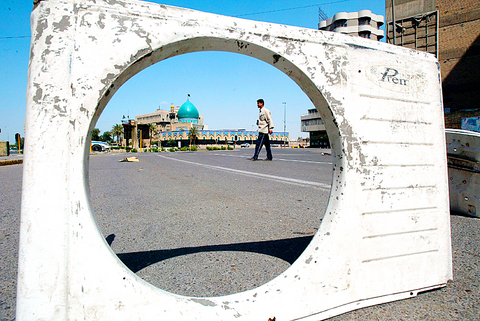Three months after a landmark election, Iraq's new parliament convened for the first time yesterday amid worsening communal violence and little sign of a deal on a government of national unity.
But the inaugural session lasted just 40 minutes and was adjourned after all 275 members of the national assembly were collectively sworn in.
Adnan Pachachi, 83, who as eldest member presided over the new assembly, said the session would adjourn until political parties could agree on who was to be elected speaker.

PHOTO: AP
"It has been decided to leave the session open pending political agreement on the designation of a speaker and his two deputies," said Pachachi, a former foreign minister.
Political parties remain deadlocked in their talks on forming a national unity government after the Dec. 15 election to choose the first full-term parliament following the US-led war that ousted former president Saddam Hussein in 2003.
"It is difficult to chose a new speaker and his deputies until a deal is reached on the whole government package," Hajem al-Hassani, the outgoing speaker, said in a televised interview.
The streets of Baghdadl were eerily quiet with vehicle traffic barred to keep car bombers at bay, while police and army units multiplied their checkpoints across the city. The 275 members of parliament met behind blast walls and razor wire in Baghdad's fortified Green Zone.
The government told civil servants to take a holiday and many other residents bunkered down at home, fearing attacks by insurgents bent on proving the caretaker government cannot guarantee security. Most shops remained closed.
Iraq's new parliament will again be dominated by the Shiite United Iraqi Alliance which can count on the support of 130 members of parliament.
The Kurdish coalition has 53 seats, while various Sunni parties control at least 55 seats. Secular-based and minority parties hold the remaining seats.
President Jalal Talabani suggested on Wednesday that the long awaited Cabinet should be ready by the end of this month, a conclusion deemed overly optimistic by rival politicians.
Outgoing Prime Minister Ibrahim Jaafari told state TV that forming the Cabinet would take a little longer: "I think a month is enough to form a government, if we keep to the Constitution."
Other politicians, however, note that deep gulfs remain on many key issues, including the Shiite choice of Jaafari to remain prime minister.
"I don't expect to see a new government before May," said one participant in the leaders' conference, Hassan Shumari, from the Shiite United Iraqi Alliance.
Deadly violence erupted in Halabja when Iraqi security forces fired into a crowd of Kurds rioting on the anniversary of Saddam's gas attack on the Kurdish town.
A 14-year-old boy was killed and six demonstrators in the clashes as some 7,000 protesters, including relatives of the 5,000 victims of the March 17, 1988 aerial attack, set up road blocks, attacked government offices and set fire to a memorial built to honor the dead.
Meanwhile, police overnight found 25 corpses that had been dumped in different parts of Baghdad, an official said.
also see story:
Milosevic and Saddam in the dock: A farce

Kehinde Sanni spends his days smoothing out dents and repainting scratched bumpers in a modest autobody shop in Lagos. He has never left Nigeria, yet he speaks glowingly of Burkina Faso military leader Ibrahim Traore. “Nigeria needs someone like Ibrahim Traore of Burkina Faso. He is doing well for his country,” Sanni said. His admiration is shaped by a steady stream of viral videos, memes and social media posts — many misleading or outright false — portraying Traore as a fearless reformer who defied Western powers and reclaimed his country’s dignity. The Burkinabe strongman swept into power following a coup in September 2022

‘FRAGMENTING’: British politics have for a long time been dominated by the Labor Party and the Tories, but polls suggest that Reform now poses a significant challenge Hard-right upstarts Reform UK snatched a parliamentary seat from British Prime Minister Keir Starmer’s Labor Party yesterday in local elections that dealt a blow to the UK’s two establishment parties. Reform, led by anti-immigrant firebrand Nigel Farage, won the by-election in Runcorn and Helsby in northwest England by just six votes, as it picked up gains in other localities, including one mayoralty. The group’s strong showing continues momentum it built up at last year’s general election and appears to confirm a trend that the UK is entering an era of multi-party politics. “For the movement, for the party it’s a very, very big

ENTERTAINMENT: Rio officials have a history of organizing massive concerts on Copacabana Beach, with Madonna’s show drawing about 1.6 million fans last year Lady Gaga on Saturday night gave a free concert in front of 2 million fans who poured onto Copacabana Beach in Rio de Janeiro for the biggest show of her career. “Tonight, we’re making history... Thank you for making history with me,” Lady Gaga told a screaming crowd. The Mother Monster, as she is known, started the show at about 10:10pm local time with her 2011 song Bloody Mary. Cries of joy rose from the tightly packed fans who sang and danced shoulder-to-shoulder on the vast stretch of sand. Concert organizers said 2.1 million people attended the show. Lady Gaga

SUPPORT: The Australian prime minister promised to back Kyiv against Russia’s invasion, saying: ‘That’s my government’s position. It was yesterday. It still is’ Left-leaning Australian Prime Minister Anthony Albanese yesterday basked in his landslide election win, promising a “disciplined, orderly” government to confront cost-of-living pain and tariff turmoil. People clapped as the 62-year-old and his fiancee, Jodie Haydon, who visited his old inner Sydney haunt, Cafe Italia, surrounded by a crowd of jostling photographers and journalists. Albanese’s Labor Party is on course to win at least 83 seats in the 150-member parliament, partial results showed. Opposition leader Peter Dutton’s conservative Liberal-National coalition had just 38 seats, and other parties 12. Another 17 seats were still in doubt. “We will be a disciplined, orderly